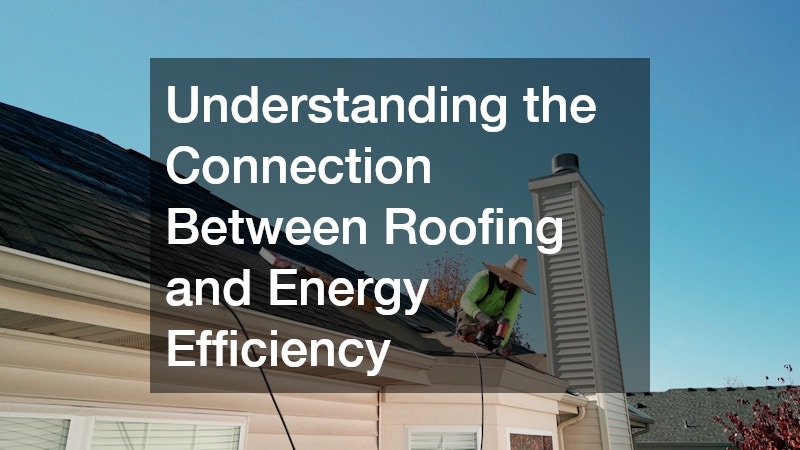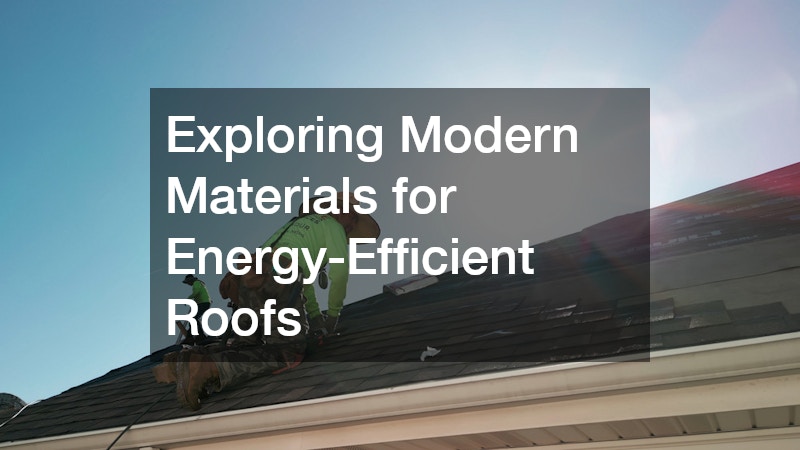Improving your home’s energy efficiency is one of the smartest investments a homeowner can make. Not only does it lower monthly utility bills, but it also enhances comfort, reduces environmental impact, and increases property value. Two of the most important systems affecting energy consumption are the roof and HVAC unit. When either one becomes outdated or inefficient, it can lead to wasted energy and higher costs. Replacing both with modern, energy-saving options creates a powerful combination that optimizes insulation, air circulation, and overall performance. With the right upgrades and professional installation, homeowners can enjoy a more comfortable living environment while significantly reducing long-term expenses.
Understanding the Connection Between Roofing and Energy Efficiency
Your roof plays a crucial role in maintaining your home’s temperature and overall energy efficiency. A properly installed and insulated roof acts as a barrier against extreme heat and cold, helping to stabilize indoor temperatures year-round. When roofing materials degrade or ventilation is inadequate, more energy is required to heat or cool the home. This not only increases utility costs but also puts additional strain on your HVAC system. Investing in an energy-efficient roof ensures your home retains conditioned air more effectively, reducing the load on your heating and cooling systems.
Partnering with experienced roofing companies can make a major difference in achieving these results. Professionals can assess your current roof for signs of inefficiency, such as worn shingles, poor ventilation, or heat loss. They can recommend reflective or cool-roof materials that minimize heat absorption during warmer months and improve insulation during winter. Many modern roofing options are designed to work in tandem with efficient HVAC systems, optimizing overall home performance. By upgrading your roof with professional guidance, you create a strong foundation for improved comfort, reduced energy waste, and sustainable savings over time.
Choosing Experienced Professionals for Roof Improvements
While material quality is important, the expertise of the professionals installing your roof is equally critical to maximizing energy efficiency. Improper installation can lead to leaks, uneven insulation, and premature wear that undermine even the best roofing products. Experienced contractors understand how to integrate energy-efficient materials with proper ventilation and underlayment, ensuring your home performs optimally in every season. Choosing the right professionals means your investment in a new roof delivers the long-term results you expect.
Working with local roofing contractors ensures that your roof is installed to meet regional climate demands and building codes. Local experts are familiar with the weather patterns, temperature fluctuations, and material preferences best suited for your area. They can recommend specific upgrades—like radiant barriers, ventilation improvements, or cool-roof coatings—that enhance your home’s efficiency. In addition, local contractors often provide faster service, personalized attention, and long-term maintenance support. Entrusting your roofing project to a qualified local team guarantees both quality workmanship and measurable energy savings for years to come.
Exploring Modern Materials for Energy-Efficient Roofs
Advancements in roofing technology have introduced a variety of materials designed to improve insulation, reflect sunlight, and reduce heat absorption. Traditional asphalt shingles are now available with energy-efficient coatings, while metal, tile, and composite roofing options offer excellent durability and temperature control. These materials help keep homes cooler in the summer and warmer in the winter, reducing strain on heating and cooling systems. Investing in modern, high-performance materials also contributes to sustainability by lowering overall energy consumption and extending the life of the roof.
Homeowners exploring residential roofing upgrades can choose from several energy-saving options tailored to their climate and aesthetic preferences. Reflective shingles, for example, minimize solar heat gain, while metal roofs with special coatings provide superior insulation and longevity. Some advanced systems even include integrated ventilation layers that regulate airflow between the roof and attic. Roofing professionals can help determine which combination of materials and design features best aligns with your efficiency goals. By selecting modern roofing materials, homeowners can create a home that not only looks beautiful but also operates more efficiently year-round.
How Upgrading Your HVAC System Reduces Energy Waste
Your HVAC system is responsible for a significant portion of your household’s energy usage. When older systems age or become inefficient, they often work harder than necessary to maintain consistent indoor temperatures. This overexertion leads to higher energy bills and more frequent breakdowns. Upgrading to a newer HVAC system ensures that your home’s climate control operates smoothly and efficiently. Modern HVAC technology is designed to regulate temperature more precisely, using less energy while keeping your living spaces comfortable.
Partnering with reputable HVAC companies allows you to explore advanced systems that balance performance with energy efficiency. Many modern units feature variable-speed motors, smart thermostats, and zoning options that allow you to control different parts of your home independently. Professional technicians can evaluate your current system’s performance and recommend upgrades suited to your home’s size, layout, and insulation levels. Replacing outdated equipment with a high-efficiency HVAC system can reduce energy consumption by up to 30%, providing long-term savings and improved indoor air quality.
Comparing Roofing Options That Lower Utility Costs
Not all roofs perform equally when it comes to energy efficiency. Factors such as material, color, slope, and insulation level can all influence how well your roof helps regulate indoor temperatures. A poorly insulated or heat-absorbing roof can cause temperature fluctuations that make your HVAC system work overtime. Conversely, energy-efficient roofing materials—such as cool asphalt, reflective metal, or green roofing systems—help maintain balanced indoor temperatures and prevent heat buildup. By understanding the advantages of each roofing type, homeowners can make informed decisions that align with both aesthetic goals and energy-saving priorities.
Consulting with a professional roofing company is the best way to determine which roof design and materials will lower your energy costs most effectively. Experts can perform energy audits, evaluate your roof’s current condition, and suggest improvements like added insulation or reflective coatings. They can also advise on local incentives or energy rebates available for environmentally friendly roofing systems. With professional insight and proper installation, your new roof can serve as a long-term solution that keeps your home comfortable while cutting energy expenses season after season.
Extending Roof Lifespan With Proper Maintenance and Insulation
A roof that is well-maintained and properly insulated not only protects your home but also significantly enhances its energy efficiency. Insulation plays a vital role in preventing heat loss during winter and keeping your home cool during summer. When combined with regular maintenance—such as cleaning gutters, replacing damaged shingles, and inspecting for leaks—insulation ensures your roof performs optimally year-round. Neglecting these tasks can lead to air leaks, higher energy bills, and premature roof deterioration. Consistent care helps maximize your roof’s lifespan while minimizing overall energy costs.
Relying on professional residential roofing services ensures that your roof remains in top condition for years to come. Experienced technicians can inspect insulation quality, seal weak spots, and recommend upgrades that improve energy efficiency. They can also apply reflective coatings or replace worn-out materials that may be contributing to temperature fluctuations. Routine maintenance from skilled roofing professionals helps detect small issues before they become costly problems, preserving both your investment and your home’s comfort. A well-insulated, properly maintained roof is one of the most effective ways to create a more energy-efficient household.
Recognizing When It’s Time for HVAC Repairs or Replacement
An HVAC system that’s struggling to keep your home comfortable can be a major source of energy waste. Over time, components like motors, coils, and compressors wear down, forcing the system to use more energy to achieve the same level of performance. Warning signs such as uneven temperatures, higher utility bills, frequent cycling, or strange noises often indicate it’s time for professional service. Prompt repairs or replacements can restore efficiency and prevent larger mechanical failures. Addressing issues early not only improves comfort but also extends the lifespan of your system.
Scheduling timely HVAC repairs ensures your heating and cooling system continues running efficiently and safely. Certified technicians can identify worn parts, fix leaks, clean filters, and recalibrate your system to optimize airflow and performance. In some cases, they may recommend upgrading certain components to meet modern efficiency standards. Professional maintenance also helps detect underlying issues before they lead to costly breakdowns or higher energy use. By staying proactive with repairs, you can maintain consistent comfort levels while keeping your energy bills under control throughout the year.
Maximizing Performance With Professional System Installation
Even the most advanced HVAC system won’t perform efficiently if it’s installed incorrectly. Proper installation is essential for ensuring that the unit operates at peak capacity, distributes air evenly, and uses energy effectively. Poorly installed systems can result in air leaks, reduced airflow, and unnecessary strain on components. Working with skilled professionals guarantees that your system’s size, layout, and connections are tailored to your home’s specific requirements. A correct installation not only enhances efficiency but also ensures long-term reliability and safety.
Investing in expert hvac installation provides immediate and lasting benefits for your home’s comfort and energy performance. Certified installers follow precise manufacturer guidelines, measure load requirements, and calibrate equipment to deliver optimal results. They also ensure that ductwork, vents, and thermostats are correctly aligned with your home’s heating and cooling needs. A properly installed system minimizes wasted energy, reduces noise, and delivers consistent temperatures across every room. With professional installation, homeowners can enjoy peace of mind knowing their HVAC system will perform efficiently and economically for many years.
Discovering the Benefits of Modern Ductless HVAC Options
As homeowners look for more efficient and customizable ways to heat and cool their homes, ductless HVAC systems have become an increasingly popular choice. Unlike traditional systems that rely on extensive ductwork, ductless units deliver air directly into different zones of the home, allowing for personalized temperature control. This zoning capability not only increases comfort but also minimizes energy waste by heating or cooling only the spaces in use. Ductless systems are quiet, flexible, and ideal for additions, remodels, or homes without existing ducts. They’re a great option for those seeking energy savings and advanced performance in one compact package.
Installing ductless hvac systems can significantly reduce energy consumption while improving indoor air quality. These systems eliminate the energy losses associated with traditional ducts, which can account for up to 30% of heating and cooling inefficiency. Ductless units are also designed with inverter technology that adjusts the compressor’s speed based on the room’s temperature needs, using only the necessary amount of energy. Professional installers can help determine the right system size and placement to ensure even airflow throughout your home. By switching to a ductless HVAC solution, homeowners can enjoy greater comfort, lower utility bills, and a more sustainable approach to climate control.
Partnering With Local Experts for Long-Term Efficiency
Maintaining long-term energy efficiency requires more than just new equipment—it depends on consistent upkeep and knowledgeable service. Partnering with trusted professionals ensures that your HVAC system and roof continue to perform at their highest level year after year. Local experts understand the unique challenges of your region’s climate and can provide tailored recommendations for upgrades, maintenance schedules, and efficiency improvements. Regular inspections, cleanings, and tune-ups help prevent issues before they escalate, keeping your systems reliable and cost-effective over time.
Working with professionals who specialize in local hvac services guarantees ongoing performance and energy savings. Local technicians are readily available for routine maintenance, emergency repairs, and system evaluations. They can monitor your system’s efficiency, adjust settings for seasonal changes, and suggest upgrades that align with evolving energy standards. Establishing a long-term partnership with local experts not only enhances your comfort but also ensures your home remains energy-efficient year-round. Reliable service and personalized attention from nearby professionals make it easier to protect your investment and maintain consistent performance.
Combining a new HVAC system with an upgraded roof is one of the most effective ways to improve your home’s energy efficiency and overall comfort. These two systems work hand in hand to regulate indoor temperatures, reduce strain on heating and cooling equipment, and lower utility bills. Modern roofing materials and HVAC technologies are designed to maximize performance while minimizing waste, helping homeowners create more sustainable and cost-effective living spaces. With proper planning, professional installation, and ongoing maintenance, these upgrades can provide years of savings and improved comfort.
As energy standards continue to evolve, investing in efficient home systems is no longer just a convenience—it’s a necessity for long-term value and sustainability. Partnering with qualified professionals for roofing and HVAC services ensures that every part of your home works together seamlessly. From choosing the right materials to maintaining peak performance, every decision contributes to lasting efficiency. By making these strategic improvements now, homeowners can enjoy a comfortable, eco-friendly home that’s ready to meet the energy demands of the future.




